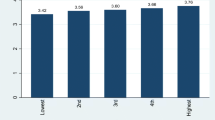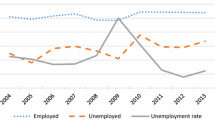Abstract
The current research examines the impact of income comparisons on life satisfaction in Turkey which has a feature of “collectivism” or “low individualism”. This is done by analyzing the results of the “Life Satisfaction Survey” applied by the Turkish Statistical Institute (TUIK) for 2011. Using ordered logit estimations, this paper reveals that most of the income comparison, interaction variables and socio-economic variables have a significant explanatory power on life satisfaction levels in Turkey. The main emphasis of the paper is that reference group’s self-reported life satisfaction is related to income comparisons, along with other socioeconomic factors. The impact of comparisons is asymmetric, in that in most cases, under-performing one’s benchmark had a greater effect than out-performing it.

Similar content being viewed by others
Notes
For a detailed information on economics and happiness, see: Frey and Stutzer (2002).
Detailed information on happiness in nations can be found at World Database of Happiness. See: Veenhoven (2014).
The model was also estimated using Huber/White-heteroscedasticity-consistent standard errors for all sample and for all categories.
At the time of writing, 1 Turkish Lira was equal to 0.47 US Dollars and 0.34 Euro.
The model without comparison variables and interactions effects is not shown in the paper, but is available upon request.
In different levels of development, impact of evaluations may differ. For instance downward evaluations work rather than upward ones in developed European countries. At a high level of development upward evaluations may not lead to an increase in life satisfaction since material aspirations are already high (or increased) as well. See Easterlin (1995), Layard (2005).
References
Blanchflower, D., Oswald, A.: Well-being over time in Britain and the USA. J. Public Econ. 88, 1359–1386 (2004)
Bodur, H., Borman, P., Özdemir, Y., Atan, Ç., Kural, G.: Quality of life and life satisfaction in patients with Behçet’s disease: relationship with disease activity. Clin. Rheumatol. 25(3), 329–333 (2006)
Caner, A.: Happiness, comparison effects, and expectations in Turkey. J. Happiness Stud, 1–23 (2014). doi:10.1007/s10902-014-9562-z
Çivitci, N., Çivitci, A.: Self-esteem as mediator and moderator of the relationship between loneliness and life satisfaction in adolescents. Pers. Individ. Differ. 47(8), 954–958 (2009)
Chung, T., Mallery, P.: Social comparison, individualism-collectivism, and self-esteem in China and the United States. Cur. Psychol. 18(4), 340–352 (1999)
Clark, Andrew E., Oswald, A.: Satisfaction and comparison income. J. Public Econ. 61, 359–381 (1996)
Clark, A.E., Senik, C.: Who compares to whom? The anatomy of income comparisons in Europe. Econ. J. 120(544), 573–594 (2010)
D’Ambrosio, C., Frick, J.R.: Individual wellbeing in a dynamic perspective. Economica 79(314), 284–302 (2012)
Deniz, M.: The relationships among co** with stress, life satisfaction, decision-making styles and decision self-esteem: an investigation with Turkish University students. Soc. Behav. Pers. Int. J. 34(9), 1161–1170 (2006)
Diener, E., Diener, M., Diener, C.: Factors predicting the subjective well-being of nations. J. Pers. Soc. Psychol. 69(5), 851 (1995)
Diener, E., Suh, E.M., Lucas, R.E., Smith, H.L.: Subjective well-being: three decades of progress. Psychol. Bull. 125(2), 276 (1999)
Diener, E., Oishi, S.: Money and happiness: income and subjective well-being across nations. In: Diener, E., Suh, E.M. (eds.) Culture and Subjective Well-being, pp. 185–218. MIT Press, Cambridge (2000)
Dumludag, D.: Life satisfaction and income comparison effects in Turkey. Soc. Indic. Res. 114(3), 1199–1210 (2013)
Dumludag, D.: Satisfaction and comparison income in transition and developed economies. Int. Rev. Econ. 61(2), 127–152 (2014)
Dumludag, D., Gokdemir, O., Vendrik, M. C.: Relative income and life satisfaction of Turkish immigrants: the impact of a collectivistic culture. EALE Conference, Ljubljana, Slovenia (2014)
Easterlin, R.: Does economic growth improve the human lot? In: David, Paul A., Reder, Melvin W. (eds.) Nations and Households in Economic Growth: Essays in Honor of Moses Abramovitz. Academic Press Inc, New York (1974)
Easterlin, R.: Will raising the incomes of all increase the happiness of all? J. Econ. Behav. Organ. 27(1), 35–48 (1995)
Easterlin, R.A.: Lost in transition: life satisfaction on the road to capitalism. J. Econ. Behav. Organ. 71(2), 130–145 (2009)
Ekici, T., Koydemir, S.: Social capital, government and democracy satisfaction, and happiness in Turkey: a comparison of surveys in 1999 and 2008. Soc. Indic. Res., 1–23 (2013)
Ferrer-i-Carbonell, A.: Income and well-being: an empirical analysis of the comparison income effect. J. Public Econ, 89(5), 997–1019 (2005)
Frey B. Stutzer, A.: What can economists learn from happiness research? J. Econ. Lit. XL, 402–435
Gokdemir, O., Dumludag, D.: Life satisfaction among Turkish and Moroccan immigrants in the Netherlands: the role of absolute and relative income. Soc. Indic. Res. 106(3), 407–417 (2012)
Hintze, J.L.: NCSS Users Guide IV. Kaysville, Utah (2007)
Hofstede, G.: Culture’s Consequences: International Differences in Work-related Values. Sage Publications, Beverly Hills (1984)
IBM Knowledge Center on 2013-02-13 at http://www-01.ibm.com/support/knowledgecenter/SSLVMB_20.0.0/com.ibm.spss.statistics.help/idh_cors.htm?lang=en
Inal, S., Subasi, F., Ay, S.M., Hayran, O.: The links between health-related behaviors and life satisfaction in elderly individuals who prefer institutional living. BMC Health Serv. Res. 7(1), 30 (2007)
Inglehart, R.: Culture Shift in Advanced Industrial Society. Princeton University Press, Princeton (1990)
Kenny, C.: Does growth cause happiness, or does happiness cause growth? Kyklos 52(1), 3–25 (1999)
Kenny, C.: Does development make you happy? Subjective wellbeing and economic growth in develo** countries. Soc. Indic. Res. 73(2), 199–219 (2005)
Layard, R.: Happiness. Lessons from a New Science. Penguin Books, New York (2005)
Layard, R., Mayraz, G., Nickell, S.: Does relative income matter? Are the critics right? In: Diener, E., Helliwell, J., Kahneman, D. (eds.) International Differences in Well-Being. Oxford University Press, New York (2010)
Luttmer, E.F.P.: Neighbors as negatives: relative earnings and well-being. Q. J. Econ. 120(3), 963–1002 (2005)
McBride, M.: Relative-income effects on subjective well-being in the cross-section. J. Econ. Behav. Organ. 45(3), 251–278 (2001)
Mayraz, G., Wagner, G. G., Schupp, J.: Life satisfaction and relative income: perceptions and evidence. IZA (2009)
Meulman, J.J., Heiser, W.J. SPSS Categories 11.0. http://www.gliemji.daba.lv/grozs/Datorlietas/SPSS/SPSS%20Categories%2011.0.pdf (2014)
Michalos, AC.: Multiple discrepancies theory (MDT). Soc. Indic. Res. 16(4), 347–413 (1985)
Namazie, C., Sanfey, P.: Happiness and transition: the case of Kyrgyzstan. Rev. Dev. Econ. 5(3), 392–405 (2001)
Oswald, A.J.: Happiness and economic performance. Econ. J. 107, 1815–1831 (1997)
Öngen, D.E.: The relationship between perfectionism and multidimensional life satisfaction among high school adolescents in Turkey. J. Multicult. Couns. Dev. 37(1), 52–64 (2009)
Sanfey, P., Teksoz, U.: Does transition make you happy? Econ. Transit. 15(4), 707–731 (2007)
Selezneva, E.: Surveying transitional experience and subjective well-being: income, work, family. Econ. Syst. 35(2), 139–157 (2011)
Selim, S.: Life satisfaction and happiness in Turkey. Soc. Indic. Res. 88(3), 531–562 (2008)
Senik, C.: When information dominates comparison: learning from Russian subjective panel data. J. Public Econ. 88(9), 2099–2123 (2004)
Senik, C.: Ambition and jealousy: income interactions in the ‘Old’Europe versus the ‘New’Europe and the United States. Economica 75(299), 495–513 (2008)
Senik, C.: Direct evidence on income comparisons and their welfare effects. J. Econ. Behav. Organ. 72, 408–424 (2009)
Schyns, P.: The relationship between income, changes in income and life-satisfaction in West Germany and the Russian Federation: relative, absolute, or a combination of both? In: Diener, E., Rahz, D.R. (eds.) Social Indicators Research Series: Advances in Quality of Life Theory and Research, pp. 83–109. Springer, Netherlands (2000)
Subaşı, F., Hayran, O.: Evaluation of life satisfaction index of the elderly people living in nursing homes. Arch. Gerontol. Geriatr. 41(1), 23–29 (2005)
Şener, A., Terzioğlu, R.G., Karabulut, E.: Life satisfaction and leisure activities during men’s retirement: a Turkish sample. Aging Mental Health 11(1), 30–36 (2007)
The Hofstede Center. http://www.geert-hofstede.com/index.php
Van Praag, B.M.S., Ferrer-i-Carbonell, A.: Happiness Quantified: A Satisfaction Calculus Approach. Oxford University Press, Oxford (2004)
Veenhoven, R.: Conditions of Happiness. Kluwer Academic, Dordrecht (1984)
Veenhoven, R.: Is happiness relative? Soc. Indic. Res. 24, 1–34 (1991)
Veenhoven, R.: Are the Russians as unhappy as they say they are? J. Happiness Stud. 2(2), 111–136 (2001)
Veenhoven, R.: Happiness in Turkey (TR), World Database of Happiness, Erasmus University Rotterdam, The Netherlands: http://www.worlddatabaseofhappiness.Viewed on 14 March 2014
Veenhoven, R.: Happiness in Nations World Database of Happiness, Erasmus University Rotterdam, The Netherlands. http://www.worlddatabaseofhappiness.eur.nl/hap_nat/nat_fp.php?mode=1. Assessed on Aug 2014
Vendrik, M.: Adaptation, anticipation and social interaction in happiness: an integrated error—correction approach. J. Public Econ. 105, 131–149 (2013)
White, K., Lehman, D.R.: Culture and social comparison seeking: the role of self-motives. Pers. Soc. Psychol. Bull. 31(2), 232–242 (2005)
Conflict of interest
We have no potential conflict of interest.
Author information
Authors and Affiliations
Corresponding author
Rights and permissions
About this article
Cite this article
Dumludag, D., Gokdemir, O. & Giray, S. Income comparison, collectivism and life satisfaction in Turkey. Qual Quant 50, 955–980 (2016). https://doi.org/10.1007/s11135-015-0185-1
Published:
Issue Date:
DOI: https://doi.org/10.1007/s11135-015-0185-1




